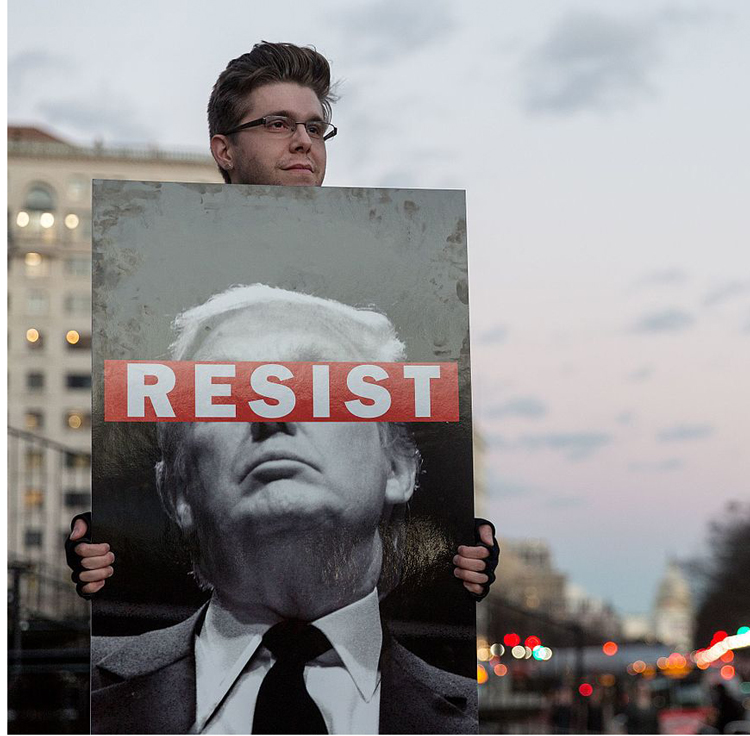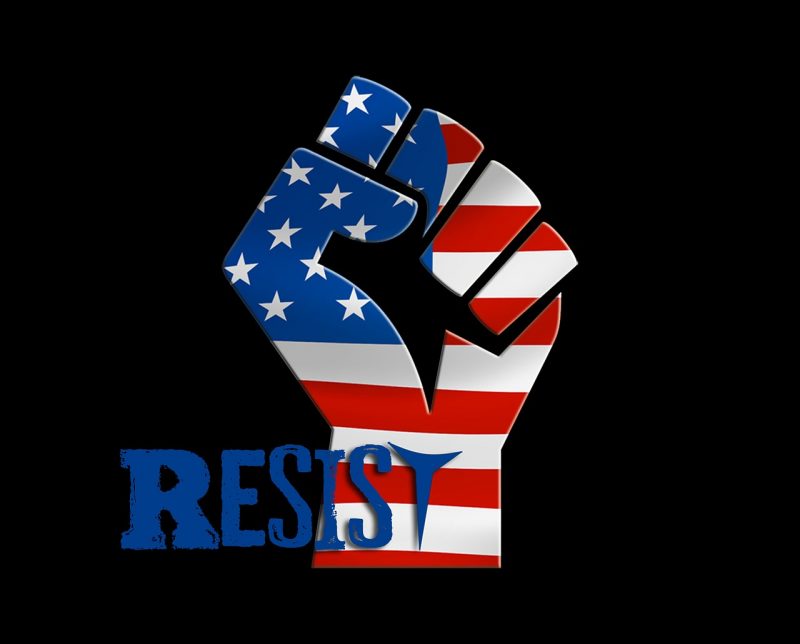TRUMP AND THE RIGHT TO #RESIST
by James Bovard
Since Donald Trump’s election, it has become fashionable for his opponents to use a #Resist hashtag on their social media postings. Public demonstrations have become more fashionable than at any time since the Vietnam War. Federal agencies are actively working to thwart the Trump administration; the Obama holdover chief of the Consumer Financial Protection Bureau even refused to vacate her office for a Trump appointee. Government employees are avidly leaking documents to the Washington Post and other papers in a way probably never seen before in American history.
Despite such efforts, Trump remains president. Barring death, resignation, impeachment, or Twenty-Fifth Amendment removal, he will continue in the White House until 2020. The controversies around his power should spur Americans to ask fundamental questions about what they owe to Washington.
For generations, politicians have talked as if citizens are obliged both to revere and obey their government. But there are few things more dangerous than swallowing the notion that government is entitled to boundless obedience. Throughout history, governments have occasionally overstepped the bounds of their legitimate power. What should be done when government betrays its promises?
John Locke’s work Two Treatises of Government was written in the 1680s, when Englishmen were chafing under the growing tyranny of the Stuart kings. Locke aimed to awaken people to the danger of servile doctrines that the monarchy was promoting. He wrote,
That subjects, or foreigners attempting by force on the properties of any people, may be resisted with force, is agreed on all hands. But that magistrates doing the same thing, may be resisted, hath of late been denied: as if those who had the greatest privileges and advantages by the law, had thereby a power to break those laws, by which alone they were set in a better place than their brethren.
Locke helped Englishmen recognize the folly of presuming that the ruler’s power was on a moral high ground compared with anyone else who assaulted them:
Should a Robber break into my House, and with a Dagger at my Throat, make me seal Deeds to convey my Estate to him, would this give him any title? Just such a title by his Sword, has an unjust Conqueror, who forces me into Submission. The injury and the Crime is equal, whether committed by the wearer of a Crown, or some petty villain. The title of the offender, and the number of his Followers make no difference in the Offence, unless it be to aggravate it.
Locke had a profound impact on the Founding Fathers, and his doctrines resonate in the Declaration of Independence and many other documents in the 1770s and 1780s. Locke’s treatises on government helped Americans recognize that no concept of sovereignty can justify extending government power beyond the bounds of political right.
Once ideas and principles consecrating unlimited power are accepted, it is only a matter of time until that power is used in ways that shock those who acquiesced to its expansion. As Sen. John Taylor of Caroline, observed in 1821, “Tyranny in form is the first step towards tyranny in substance.”
It is absurd to expect governments to descend into barbarism gradually, step by step — as if there were a train schedule to political hell and people could get off at any stop along the way. People forget how quickly the forms of political power can turn civilized behavior into unrestrained pillage and mass violence. Most people strolling the streets of German towns in the late 1920s would never have suspected that, within two decades, the government would launch a policy of genocide. Similarly, someone visiting Moscow in 1913 or Phnom Penh in 1969 would probably not have seen the barbarity just around the bend. Politicians rarely give formal warnings of how they intend to abuse the power they acquire.
History is replete with tyrannical governments that deserved to be destroyed by their victims. At what point can we say that a government has placed itself in a state of war with the citizenry? By what standard or measure can people know when they have a right to forcibly resist illegitimate power? In Bosnia, in Rwanda, or in other areas where mass murders have recently occurred, the citizen obviously may use as much deadly force as necessary to prevent himself and his family from being slaughtered by rampaging government forces or by murderous private mobs acting with government sanction. And in the United States, blacks clearly had a right to peacefully resist segregationist laws in the 1950s and 1960s and had a right to violently resist attacks on them by sheriffs and private citizens.
Unfortunately, there is no lucid standard by which a citizen can know precisely when he must cease obeying. And, regrettably, much of the media, like the Anglican Church in the 1680s, will preach the duty of passive resistance all the way to the entrance of the political slaughterhouse. Indeed, there was perhaps almost nothing that Barack Obama could have done that would have allowed the media the same right of resistance that many pundits trumpeted after the 2016 election.
Parlor talk
Trump, like recent presidents commanding armies of enforcement agents with sweeping prerogatives, is a threat to our rights and liberties. His comments in a New York speech in July endorsing the roughing up arrestees by police were appalling by any standard. Luckily, his blather cannot negate local, state, and federal laws against such abuses. On the other hand, Attorney General Jeff Sessions’s campaign to revive the drug war and asset forfeiture poses a far more direct peril.
But there is a paradox in the anti-Trump “resistance.” Many of the liberals who are most vehemently opposed to Trump also support government confiscation of private firearms. Perhaps they believe that as long as they still have their Twitter hashtags, their rights will be safe from government oppression.
But discussions of political right are mere parlor talk unless citizens have a right to resist tyranny. The New Hampshire Bill of Rights, written in 1784, declared, “The doctrine of nonresistance against arbitrary power, and oppression, is absurd, slavish, and destructive of the good and happiness of mankind.” Yet much of the political and academic establishment shudders at even considering the right to resist.
But as Joyce Lee Malcolm showed in her 1994 book, To Keep and Bear Arms: The Origins of an Anglo-American Right, the Second Amendment was based on recognition that people had the right to possess the means to resist government tyranny. Discussions on federal gun-control measures often focus on whether specific guns serve “sporting purposes.”
Another paradox of the Trump opposition is that many of them seem most angry about the president’s policies that reduce federal power. Many Trump opponents are not opposed to dictators per se; they simply want different dictates. Trump was widely denounced because his Justice Department refuses to compel every public school in the nation to make special bathroom and locker-room accommodations for self-proclaimed transgender kids. But the Constitution did not grant the federal government jurisdiction over “gender identity.”
But it is possible that Trump will do things in the future that will enrage even Americans who favor a much smaller role for government. The most likely provocation would be pushing the United States into an unnecessary war against Iran, North Korea, or some other designated foreign villain.
If that happens, the #Resist movement could instantly become far more powerful — if enough Americans recognize the folly and peril. In such a case, citizens should begin by realizing how much leverage they have to bring government to its knees. At the height of the Vietnam War protests, fewer than 5 percent of the American public were actively protesting the War, yet those protests psychologically paralyzed the Johnson administration and played a role in the Nixon administration’s war against dissent that led to Watergate.
In the final realm, the power of the Trump administration will be limited by the character strength of the American people. If the citizens have self-respect and courage — and the means to defend their rights — government abuses will eventually be curbed.
Intelligent, targeted, decisive protests can puncture the sense of legitimacy that cossets both Leviathan’s commanders and employees. And once the government’s aura of legitimacy is shattered, the “transaction costs” of oppressive policies skyrocket. Each person who understands his rights and liberties is another barrier against the wrongful expansion of government power. As 16th-century French philosopher Etienne de la Boétie observed, “It is the inhabitants themselves who permit, or, rather, bring about their own subjection, since by ceasing to submit they would put an end to their servitude.”
It remains to be seen whether the #Resist movement will result in any increase in political savvy among the American people. As Benjamin Constant wrote in 1815, “It is in fact the degree of force, not its holders, which must be denounced…. There are weights too heavy for the hand of man.” Unfortunately, many Trump opponents will never make an adverse inference against arbitrary power because they seek to put government itself back on a pedestal.
This article was originally published in the March 2018 edition of Future of Freedom.
Thanks to Wikimedia for that zippety photo
And here’s another neat graphic from Pixabay




“We believe that no government can exist in peace, except such laws are framed and held inviolate as will secure to each individual the free exercise of conscience, the right and control of property, and the protection of life.”
This defines my belief and the parameters of lawful vs. unlawful government. If any of these are not held as “inviolate” the authority must be challenged and if unresponsive, “abolished”, which is usually the case.
We are well beyond this now.